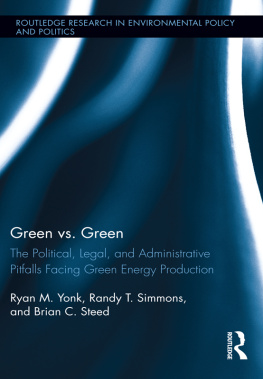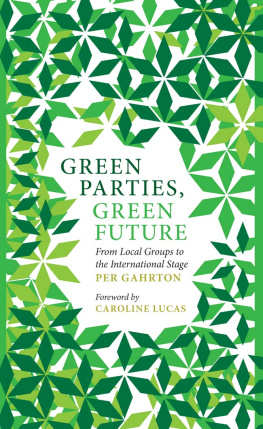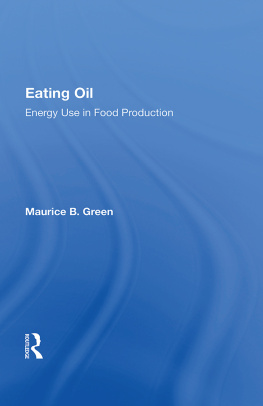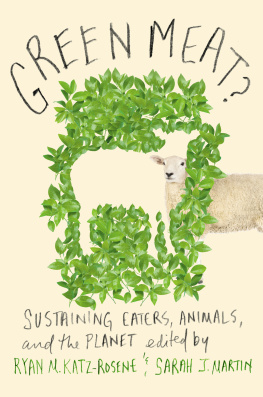To effectively mitigate against climate change, the U.S. needs coherent policies that support the delivery of clean energy to the market. Filled with lucid and poignant examples, this book thoughtfully shows how our often-conflicted regulatory environment impedes the efforts of clean energy entrepreneurs to implement their ideas.
Eric Coleman, The Florida State University
Green vs. Green
Renewable and carbon-neutral energy have been promoted as the future of energy production in the United States. Non-traditional energy sources show promise as alternatives to fossil fuels and may provide a sustainable source of energy in increasingly uncertain energy markets. However, these new sources of energy face their own set of political, administrative, and legal challenges. Green vs. Green explores how mixed land ownership and existing law and regulation present serious challenges to the development of alternative energy sources in the United States.
Analytically examining and comparing five green energy sectors; wind, solar, geothermal, biofuel and hydro power, Ryan M. Yonk, Randy T. Simmons, and Brian Steed argue that discussing alternative energy without understanding these pitfalls creates unrealistic expectations regarding the ability to substitute green energy for traditional sources. The micro-goals of protecting individual areas, species, small-scale ecosystems, and other local environmental aims often limits ability to achieve macro-goals like preventing global climate change or transitioning to large-scale green energy production. Statutes and regulations designed to protect environmental and cultural integrity from degradation directly conflict with other stated environmental ends. Although there is substantial interest in adding clean energy to the grid, it appears that localized environmental interests interfere with broader environmental policy goals and the application of existing environmental laws and regulations may push us closer to gridlock.
Green vs. Green provides a fascinating look into how existing environmental law created or will create substantial regulatory hurdles for future energy generations.
Ryan M. Yonk is Assistant Professor of Political Science at the Department of Political Science and Criminal Justice, Southern Utah University and Research Director of the Center for Public Lands and Rural Economics, Utah State University.
Randy T. Simmons is Professor of Economics and Director of the Institute of Political Economy at Utah State University's Jon M. Huntsman School of Business, Senior Fellow at the Independent Institute, and former Mayor of Providence, Utah. He is a member of the Board of Directors of the Utah League of Cities and Towns and a Member of the Utah Governor's Privatization Commission.
Brian C. Steed is Instructor of Economics at the Huntsman School of Business at Utah State University, where he teaches in the Department of Economics. As an academic, Dr. Steed has worked on projects sponsored by various governmental and non-governmental agencies. His research examines the intersection of law, economics and policy, with a particular focus on land, resources, energy, the environment, and international development.
Routledge Research in Environmental Policy and Politics
1 Green vs. Green
The Political, Legal, and
Administrative Pitfalls Facing
Green Energy Production
Ryan M. Yonk, Randy T. Simmons,
and Brian C. Steed
Green vs. Green
The Political, Legal, and Administrative
Pitfalls Facing Green Energy Production
Ryan M. Yonk, Randy T. Simmons,
and Brian C. Steed

NEW YORK AND LONDON
First published 2013
by Routledge
711 Third Avenue, New York, NY 10017
Simultaneously published in the UK
by Routledge
2 Park Square, Milton Park, Abingdon, Oxon OX14 4RN
Routledge is an imprint of the Taylor & Francis Group,
an informa business
2013 Taylor & Francis
The right of Ryan M. Yonk, Randy T. Simmons, and Brian C. Steed to be identified as authors of this work has been asserted by them in accordance with sections 77 and 78 of the Copyright, Designs and Patents Act 1988.
All rights reserved. No part of this book may be reprinted or reproduced or utilised in any form or by any electronic, mechanical, or other means, now known or hereafter invented, including photocopying and recording, or in any information storage or retrieval system, without permission in writing from the publishers.
Trademark Notice: Product or corporate names may be trademarks or registered trademarks, and are used only for identification and explanation without intent to infringe.
Library of Congress Cataloging-in-Publication Data
Yonk, Ryan M.
Green vs. green : the political, legal, and administrative pitfalls facing green
energy production / Ryan M. Yonk, Randy T Simmons, Brian C. Steed.
p. cm. (Routledge research in environmental policy and politics ; 1)
1. Renewable energy sourcesUnited States. 2. Energy policy
Environmental aspectsUnited States. I. Simmons, Randy T. II. Steed,
Brian C. III. Title.
HD9502.U52Y66 2012
333.794dc23
2012010569
ISBN13: 978-0-415-53127-6 (hbk)
ISBN13: 978-0-203-11613-5 (ebk)
Typeset in Sabon
by IBT Global.
Contents
List of Figures and Tables
FIGURES
BLM land available for solar energy development.
Decision to fight.
Carbon-debt of biofuels.
TABLES
Exit, Voice, and Loyalty
Levels of Stakeholders
Stakeholders' Tools
Acknowledgments
Similar to our other collaborative projects, this book would not have been possible without a dedicated research team and supportive staff. As the idea for this book began to grow out of our previous research ventures and our trip around Utah's renewable energy plants, our research team continued to support our massive undertaking. Hours upon hours were spent tediously reviewing the United States' Code, Code of Federal Regulations, Legal Cases, Environmental Impact Statements, and many more monotonous documents. In addition, we thank the staff at both Southern Utah University and Utah State University for supporting the idea and doing their upmost to ensure we had all the tools necessary.
To our researchers at Southern Utah University, when deadlines were close, the hours were late, and the work was bland, you always stepped up and worked. We want to recognize the great work done by: Traves Bills aka Bubba, Rhett Busk, Matthew Coates, Heidi Eysser, Nick Hilton, Amy McIff, and Neal Mason. We appreciate your willingness to work with us, meet deadlines, and your mastery of the material.
Our research team at Utah State University deserves special attention for their readiness to being managed from afar when necessary. We thank you for the late nights and hours spent in front of a computer, reading and editing. Thank you for completing last-minute projects, answering our phone calls and emails, and putting in the time to make this book possible. This research team included: Joshua Blotter, Richard Criddle, Joshua DeFriez, Danika Foley, Luci Griffiths, Dan Groberg, Justine Larsen, R. Christopher Martin, and Sarah Reale.
Of course we need to thank Kayla Harris. Without Kayla this book would not exist. Kayla was willing to drop everything and devote herself to making sure that this book was finished. Not only did Kayla spend hours editing, but also she was willing to pick up any slack, from both team members and especially from us. Kayla put her life on hold in order to get this book done, and we are indebted to her for her hard work, dedication, and patience.












